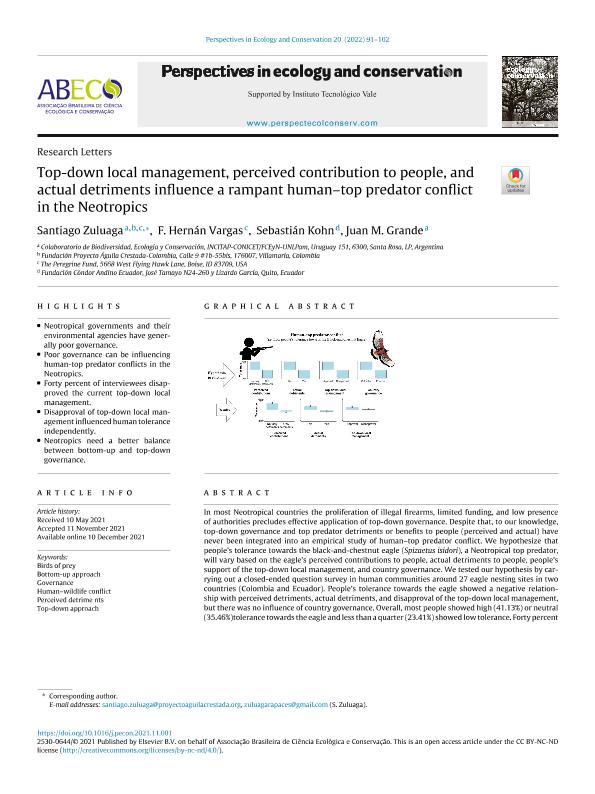Mostrar el registro sencillo del ítem
dc.contributor.author
Zuluaga Castañeda, Santiago

dc.contributor.author
Vargas, F. Hernán
dc.contributor.author
Kohn, Sebastián
dc.contributor.author
Grande, Juan Manuel

dc.date.available
2023-09-06T16:14:33Z
dc.date.issued
2022-04
dc.identifier.citation
Zuluaga Castañeda, Santiago; Vargas, F. Hernán; Kohn, Sebastián; Grande, Juan Manuel; Top-down local management, perceived contribution to people, and actual detriments influence a rampant human‒top predator conflict in the Neotropics; Elsevier; Perspectives in Ecology and Conservation; 20; 2; 4-2022; 91-102
dc.identifier.issn
2530-0644
dc.identifier.uri
http://hdl.handle.net/11336/210730
dc.description.abstract
In most Neotropical countries the proliferation of illegal firearms, limited funding, and low presence of authorities precludes effective application of top-down governance. Despite that, to our knowledge, top-down governance and top predator detriments or benefits to people (perceived and actual) have never been integrated into an empirical study of human‒top predator conflict. We hypothesize that people's tolerance towards the black-and-chestnut eagle (Spizaetus isidori), a Neotropical top predator, will vary based on the eagle's perceived contributions to people, actual detriments to people, people's support of the top-down local management, and country governance. We tested our hypothesis by carrying out a closed-ended question survey in human communities around 27 eagle nesting sites in two countries (Colombia and Ecuador). People's tolerance towards the eagle showed a negative relationship with perceived detriments, actual detriments, and disapproval of the top-down local management, but there was no influence of country governance. Overall, most people showed high (41.13%) or neutral (35.46%) tolerance towards the eagle and less than a quarter (23.41%) showed low tolerance. Forty percent of people disapproved of the top-down local management. We documented human persecution of this top predator in the majority of sampled nests (59%, 16 of 27) and across all the geographical jurisdictions assessed. Our results suggest that poor governance could also negatively affect other human‒top predator conflicts in the Neotropics. To be more effective at saving top predators in the Neotropical Region, structural changes such as a better balance between bottom-up and top-down approaches and, thus, co-management among stakeholders are needed.
dc.format
application/pdf
dc.language.iso
eng
dc.publisher
Elsevier

dc.rights
info:eu-repo/semantics/openAccess
dc.rights.uri
https://creativecommons.org/licenses/by-nc-nd/2.5/ar/
dc.subject
BIRDS OF PREY
dc.subject
BOTTOM-UP APPROACH
dc.subject
GOVERNANCE
dc.subject
HUMAN‒WILDLIFE CONFLICT
dc.subject
PERCEIVED DETRIMENTS
dc.subject
TOP-DOWN APPROACH
dc.subject.classification
Conservación de la Biodiversidad

dc.subject.classification
Ciencias Biológicas

dc.subject.classification
CIENCIAS NATURALES Y EXACTAS

dc.title
Top-down local management, perceived contribution to people, and actual detriments influence a rampant human‒top predator conflict in the Neotropics
dc.type
info:eu-repo/semantics/article
dc.type
info:ar-repo/semantics/artículo
dc.type
info:eu-repo/semantics/publishedVersion
dc.date.updated
2023-07-05T15:20:27Z
dc.journal.volume
20
dc.journal.number
2
dc.journal.pagination
91-102
dc.journal.pais
Países Bajos

dc.journal.ciudad
Amsterdam
dc.description.fil
Fil: Zuluaga Castañeda, Santiago. Consejo Nacional de Investigaciones Científicas y Técnicas. Instituto de Ciencias de la Tierra y Ambientales de La Pampa. Universidad Nacional de La Pampa. Facultad de Ciencias Exactas y Naturales. Instituto de Ciencias de la Tierra y Ambientales de La Pampa; Argentina. Fundación Proyecto Águila; Colombia. Peregrine Fund Incorporated; Estados Unidos
dc.description.fil
Fil: Vargas, F. Hernán. Peregrine Fund Incorporated; Estados Unidos
dc.description.fil
Fil: Kohn, Sebastián. Fundación Cóndor Andino; Ecuador
dc.description.fil
Fil: Grande, Juan Manuel. Consejo Nacional de Investigaciones Científicas y Técnicas. Instituto de Ciencias de la Tierra y Ambientales de La Pampa. Universidad Nacional de La Pampa. Facultad de Ciencias Exactas y Naturales. Instituto de Ciencias de la Tierra y Ambientales de La Pampa; Argentina
dc.journal.title
Perspectives in Ecology and Conservation
dc.relation.alternativeid
info:eu-repo/semantics/altIdentifier/url/https://www.sciencedirect.com/science/article/pii/S2530064421000936
dc.relation.alternativeid
info:eu-repo/semantics/altIdentifier/doi/http://dx.doi.org/10.1016/j.pecon.2021.11.001
Archivos asociados
